| Srl | Item |
| 1 |
ID:
108143
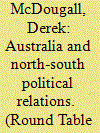

|
|
|
|
|
| Publication |
2011.
|
| Summary/Abstract |
North-South issues as such do not figure prominently in Australia's international policy but are mostly implicit. These issues arise particularly in the context of Australia's relations with countries in its immediate vicinity, including the South Pacific, Indonesia and East Timor. There are also some global issues in the North-South context where Australia is affected. Australian governments, in developing policies relating to this context, have been influenced by a 'practical realism' that puts first priority on Australian interests as perceived by governments at any given time. The way in which those policies have been developed, in both the regional and the global contexts, can be assessed through an examination of issues relating to security and international economic relations. Australia's alliance relationship has a strong bearing on the way Australia approaches the security issues. In relation to international economic issues there are many commonalities with fellow producers of raw materials in the Global South.
|
|
|
|
|
|
|
|
|
|
|
|
|
|
|
|
| 2 |
ID:
096410
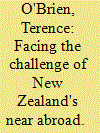

|
|
|
| 3 |
ID:
084597
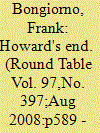

|
|
|
|
|
| Publication |
2008.
|
| Summary/Abstract |
The Australian federal election of 24 November 2007 saw the defeat of the Howard Liberal-National Party coalition government after almost 12 years in office and brought to power a Labor government, the first since 1996, under the leadership of Kevin Rudd. John Howard, Australia's second longest-serving prime minister, became only the second prime minister to lose his own seat at an election. This article summarizes the election result and places it in the context of post-Second World War Australian political and electoral history. The highly unusual character of the large swing to the Labor Party is underlined, as is the rarity of a change of government in Australia since the Second World War. The article also examines the influence of the political leadership of the two major parties in contributing to the changing climate of opinion during 2007 and surveys the campaign itself, underlining the many problems experienced by the Howard government in the final weeks of its life. Finally, the article emphasizes the critical roles that interest rates, climate change and industrial relations all played in fatally undermining the Howard ascendancy. The government, faced with a politically credible and electorally attractive opponent, emerging economic difficulties and a shifting policy agenda, was unable to present itself as equipped to deal with new local and global challenges after a long period in power.
|
|
|
|
|
|
|
|
|
|
|
|
|
|
|
|
| 4 |
ID:
094044
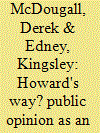

|
|
|
|
|
| Publication |
2010.
|
| Summary/Abstract |
Using the typology developed by Douglas Foyle, this article argues that John Howard behaved as a 'pragmatist' in dealing with situations where public opinion was relevant to Australia's engagement with Asia. Howard adhered to his own views on the relevant issues while attempting to lead public opinion in the direction he believed desirable. During the 1996-2007 period the most relevant issues relating to the impact of public opinion on Australia's Asian engagement were Australia's relations with Indonesia and Asian immigration. In the case of Australian-Indonesian relations the Howard government had to deal with various situations where an activated public opinion threatened to undermine the long term Australian approach that gave primacy to Indonesian concerns. Political leadership entailed developing a response that the government believed to be appropriate to Australia's long term objectives, while also attempting to persuade the public that this was the case. In the second instance policy developed in a more 'deliberative' context: Howard modified his earlier stance that was critical of Asian immigration, but continued to adhere to a strongly 'integrationist' position. This position was consistent with both his own views and his perception of public attitudes on the matter.
|
|
|
|
|
|
|
|
|
|
|
|
|
|
|
|
| 5 |
ID:
114012
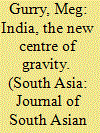

|
|
|
|
|
| Publication |
2012.
|
| Summary/Abstract |
Australia-India relations continue to puzzle foreign policy analysts. The reasons for stronger ties seem obvious, yet each successive Australian government has proved unable to forge the links necessary for more fruitful collaboration. Prime minister John Howard made two visits to India. His second visit in 2006-when he expressed unqualified enthusiasm for India's fast-growing economy and for the development of a new centre of gravity for the world, the emerging 'global middle class' of China and India-promised to change the language of engagement from neglect to partnership. This paper examines the context of the changing relationship, looks at the role of leadership in the formulation of foreign policy, and asks whether the momentum developed from Howard's visit was deep and strong enough to sustain the shocks ahead-the 2009 attacks on Indian students and the reversal of the decision on the sale of uranium-and to maintain a position for Australia in India's growing global engagement.
|
|
|
|
|
|
|
|
|
|
|
|
|
|
|
|
| 6 |
ID:
095150
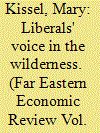

|
|
|
| 7 |
ID:
190989
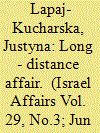

|
|
|
|
|
| Summary/Abstract |
Australia played an important role in the acceptance of the November 1947 UN Partition Resolution underpinning the establishment of the State of Israel, recognising the nascent Jewish state in January 1949 and presiding over its admission to the UN four months later. In subsequent decades, the two states have developed a close and warm relationship (albeit not without the odd political disagreement) and multifaceted political, economic, technological, and strategic collaboration. This article explores the nature and characteristics of this relationship as it evolved the past seven decades in an attempt to determine its underlying causes and most important driving forces.
|
|
|
|
|
|
|
|
|
|
|
|
|
|
|
|
| 8 |
ID:
073211
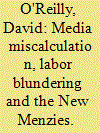

|
|
|